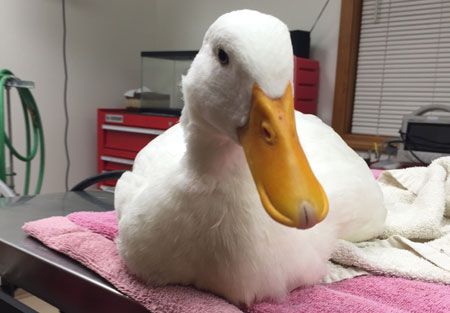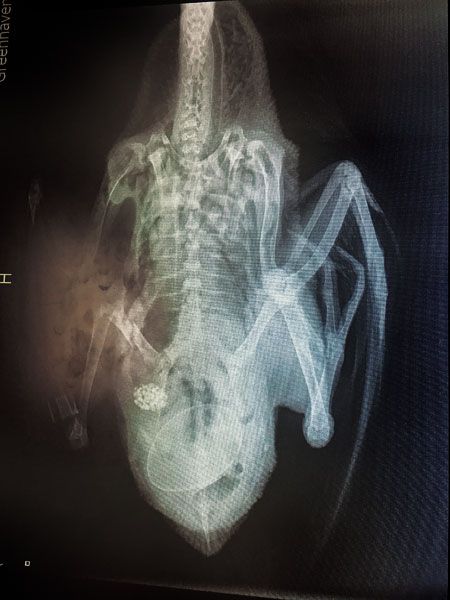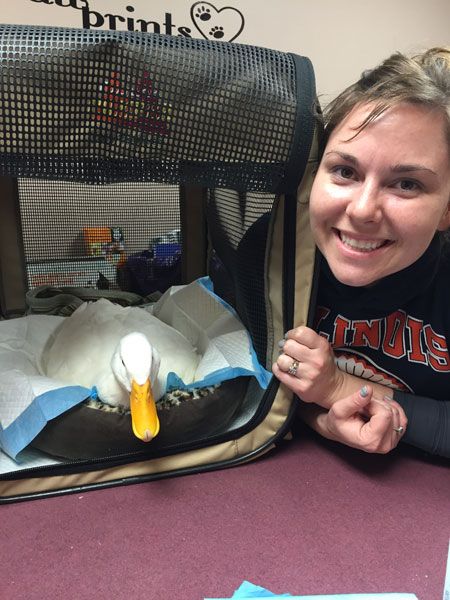What the duck?!
As mixed animal associate, this may be my most eggcellent emergency.

All images courtesy of Dr. Erika EigenbrodI work at a rural mixed practice clinic, and our on-call schedule is a week at a time. It was my last night on call before handing the torch to my colleague. My husband and I were debating who would give our son a bath when the phone rang. I picked up and the voice on the other end said, "Hello, Doctor? This is the answering service. We have a client on the phone calling to say her duck is lethargic."
Immediately I thought I'd heard wrong. "I'm sorry, a duck!?"
"Yes, Doctor, that's correct. A duck," the voice replied.
"Oh, OK. Well, can you patch me through, please?"
As the phone was ringing through to the client, I was still thinking I had the wrong animal. Am I really being called for a duck emergency? I didn't know we even treated ducks! Sure enough, it was in fact a duck emergency! After talking with the owner, it was clear Twizzler the duck was in distress, and the pet owners would really appreciate it if someone could meet them at the clinic.
On my way to clinic, I racked my brain for any information I'd learned in school about ducks. I couldn't even remember having a lecture on “duck” medicine! While slightly panicking over what I could and couldn't give a duck, I called a colleague for advice, which he so graciously gave over the phone.
On arrival Twizzler seemed pretty alert, but she was having difficulty standing and some difficulty breathing. The pet owners explained two weeks before they'd noticed Twizzler limping, but she seemed OK. And they hadn't seen her lay an egg this week, but sometimes she skipped weeks.
Their ducks aren't just run-of-the-mill farm ducks. They have a very nice habitat with a kiddie pool, and the pet owners keep a keen eye on them.
On physical exam, I couldn't feel any broken bones or abscesses, but she did appear to be quite warm. I gave her a few medications for pain and some fluids under the skin, but nothing appeared to relax her. I suggested we take a radiograph just to make sure she wasn't egg bound.

Well, the picture shows it! There's a very large, catawampus egg trying to come out. The other abnormality seen is the fracture to her left femur, which contributed to the egg bound dilemma. After explaining what was going on to the pet owners and showing them the radiographs, I needed to get the egg out.
I tried manual extraction (self-explanatory) with no luck. I gave her calcium and I tried using warm water and fluid bags to help the muscles contract. That didn't work.
After spending a considerable amount of time in the tail end of the Pekin duck, I was running out of options. And it was clear Twizzler was becoming more and more distressed. I reached out to an exotics friend of mine, who suggested anesthetizing her to help her relax. After thanking her for the advice, I once again talked with the owners. I explained the risks of anesthesia and the fact that at this point Twizzler had a guarded prognosis, but ultimately we needed to get the egg out. The owners agreed, and to the surgery room we went.
Once relaxed, I again tried to manually extract the egg. Finally! After just a few tries, my finger touched it. Moving the tissue folds over the egg, it was so close. I inserted a needle through the shell as one of the owners gladly helped draw out some of the contents, collapsing the shell slightly. Once slightly collapsed, the egg was able to be removed.
Finally. Yes! I did it! The egg was out. What a relief.
I turned off the gas anesthesia and started to recover Twizzler. Once with it (or mostly with it), Twizzler immediately started acting normally again. The next 24 to 48 hours would be crucial, but Twizzler seemed to be on the right track.
Still curious about Twizzler's fracture? By the time Twizzler became egg bound there was good callus formation at the fracture sight. She was not limping at home, the alignment of the fracture appeared satisfactory on the radiograph, and I felt the best choice for her at that time was to let her body continue to heal the fracture on its own.
Being a doctor of veterinary medicine, your career, patients and situations will never happen in the idealistic way you might have once thought. I'm learning to embrace this, and I'm starting to think this could even be a perk of the job. Never did I think I would be called to do an emergency egg extraction on a duck named Twizzler, but the bond between humans and their animals is amazing. Plus, what a great tale (or should I say "tail") it is to tell!
Thank you to my colleagues for helping in a pinch, and thank you to Twizzler's family for loving your ducks. And thanks to Twizzler for being ever so patient as I worked at your tail end for a successful “eggstraction.”
Dr. Erika Eigenbrod is an associate veterinarian at Greenhaven Animal Clinic in San Jose, Illinois.

Dr. Eigenbrod, pictured with Twizzler